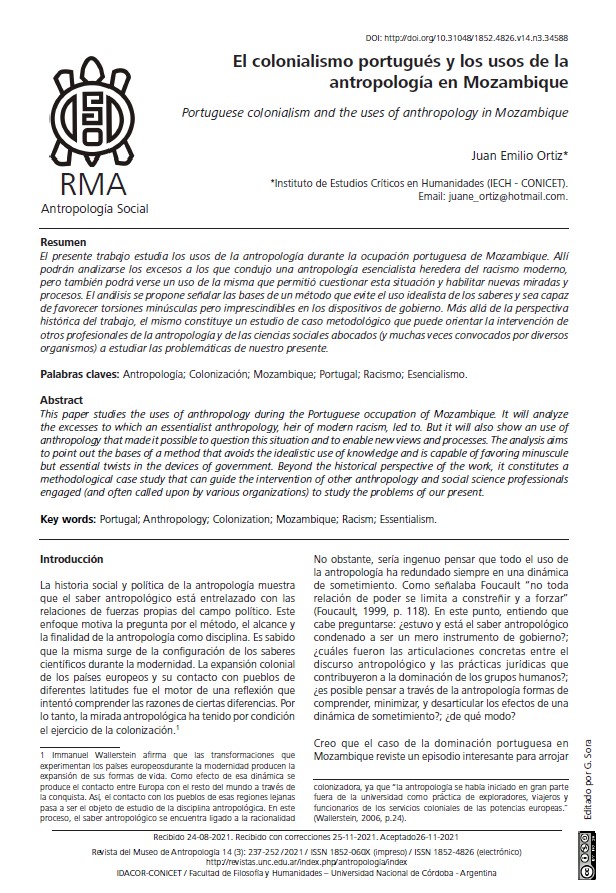Portuguese colonialism and the uses of anthropology in Mozambique
DOI:
https://doi.org/10.31048/1852.4826.v14.n3.34588Keywords:
Portugal, Anthropology, Colonization, Mozambique, Racism, EssentialismAbstract
This paper studies the uses of anthropology during the Portuguese occupation of Mozambique. It will analyze the excesses to which an essentialist anthropology, heir of modern racism, led to. But it will also show an use of anthropology that made it possible to question this situation and to enable new views and processes. The analysis aims to point out the bases of a method that avoids the idealistic use of knowledge and is capable of favoring minuscule but essential twists in the devices of government. Beyond the historical perspective of the work, it constitutes a methodological case study that can guide the intervention of other anthropology and social science professionals engaged (and often called upon by various organizations) to study the problems of our present.
Downloads
References
Althusser, L. (1988)Ideología y aparatos ideológicos del Estado. Freud y Lacan, NuevaVisión, Buenos Aires, 1988.
De Bragança, A; O’ LAUGHLIN, B. (1996) “O trabalho de Ruth First no Centro de Estudos Africanos” Estudos moçambicanos, no. 14, pp. 113-126.
Avelar, I. (2017) “Escenas decibles, escenas indecibles. Raza y sexualidad en Gilberto Freyre.” Cuadernos de Literatura. Vol. XXI, N° 42.
Badiou, A. (2002) Condiciones. Siglo XXI: Buenos Aires.
Cahen, M. (2015). “Seis teses sobre o trabalho forçado no império português continental em África”, Revista África, nº 35, p. 129-155.
Cahen, M. (2005) “Luta de emancipação anti-colonialou movimento de libertação nacional?Processo histórico e discurso ideológico –o caso das colónias portuguesase de Moçambique, em particular” Africana studia. VIII.
Cahen, M. (2015) “Pontos comuns e heterogeneidade das culturas políticas nos palops – um ponto de vista pos-poscolonial.” História: Questões & Debates, Curitiba, volume 62, n.1.
Castelo, C. (2008).“O Outro no labirinto imperial: orientalismo e lusotropicalismo”. In Globalização no divã, Blanes, Ruy; Carmo, Renato & Melo, Daniel (eds.), Lisboa, Editora Tinta-da-China, 2008, pp. 295-315.
Castelo, C. (2011) “Uma incursão no lusotropicalismo de Gilberto Freyre”Blogue de História Lusófona. Ano VI.
Farrán, R. (2021) La razón de los afectos. Populismo, feminismo, psicoanálisis. Prometeo: Buenos Aires.
Farré, A. (2015) “Las Mujeres y el Mito de la Agricultura de Subsistencia. De la exportación de alimentos a la dependencia alimentaria en el sur de Mozambique” Cadernos de Estudos Africanos, núm. 29, enero-junio, 2015, pp. 30-58
Foucault, M. (1999). Estética, ética y hermenéutica. Paidós: Buenos Aires.
Fry, P. (2003) “Culturas da diferença: séquelas das políticas coloniais portuguesas e británicas na África austral”Afro-Ásia, 29/30, pp. 271-316.
Hegel, G.W.F. (2009) Filosofía del Derecho. Editorial Claridad: Buenos Aires.
Macagno, L. (2009) “Fragmentos de uma imaginação nacional”RBCS Vol. 24 no 70 junho
Macagno, L. (2009) “The birth of cultural materialism? A debate between Marvin Harris and António Rita-Ferreira”
Macagno, L. (2015) “Antropólogos na “África portuguesa”: história de uma missão secreta”
Macagno, L. (2019) A invenção do assimilado. Paradoxos do colonialismo em Moçambique. Edições Colibri: Lisboa.
Meneses, M.. (2018). “Colonialismo como violência: a ‘missão civilizadora’ de Portugal em Moçambique”, Revista Crítica de Ciências Sociais, número especial, pp. 115-140.
Muñido, F. (1949), “La orientación etnológica en el proyecto definitivo de código penal para indígenas de Mozambique” Cuadernos de Estudios Africanos.Número 6.
Rosas, F. (2018) História a História: Africa. Edições Tinta da China: Lisboa.
Pereira, R. (2016) “Recortar, dividir, segmentar: saberes coloniales y su extensión poscolonial en Mozambique.” Revista de Antropología Social. Ediciones Complutense.
Said, E. (2008) El orientalismo. Debolsillo: Barcelona.
Sumich, J. (2010) “Partido fuerte, ¿Estado débil?: Frelimo y la supervivencia estatal a través de la guerra civil em Mozambique”Revista de estudios sociales N° 37. Universidad de Los Andes.
Texeira, N. (1987). “Política externa e política interna no Portugal de 1890: o Ultimatum Inglês”, Análise Social, vol. XXIII, nº 98, pp. 687-719.
Vilensky, A. (1968) “El proceso asimilacionista hasta la reforma legislativa del bienio 1961/1962”Tendencias de la legislación ultramarina portuguesa en África. Editorial Pax: Braga.
WALLERSTEIN, I. (2006) Abrir las ciencias sociales.Siglo XXI Editores:México.
Zamparoni, V. (2007). De escravo a cozinheiro: Colonialismo & racismo em Moçambique. Editora da Universidade Federal da Bahia: Salvador

Downloads
Published
Issue
Section
License
Copyright (c) 2021 Juan Emilio Ortíz

This work is licensed under a Creative Commons Attribution-NonCommercial-ShareAlike 4.0 International License.
Those authors who have publications with this Journalaccept the following terms:
a. Authors will retain their copyrights and guarantee the journal the right of first publication of their work, which will be simultaneously subject to the Creative Commons Attribution License (Licencia de reconocimiento de Creative Commons) that allows third parties to share the work as long as its author and his first publication in this journal.
b. Authors may adopt other non-exclusive licensing agreements for the distribution of the version of the published work (eg, deposit it in an institutional electronic file or publish it in a monographic volume) provided that the initial publication in this journal is indicated.
c. Authors are allowed and recommended to disseminate their work on the Internet (eg in institutional telematic archives or on their website) before and during the submission process, which can lead to interesting exchanges and increase citations of the published work. (See The Effect of Open Access - El efecto del acceso abierto)











